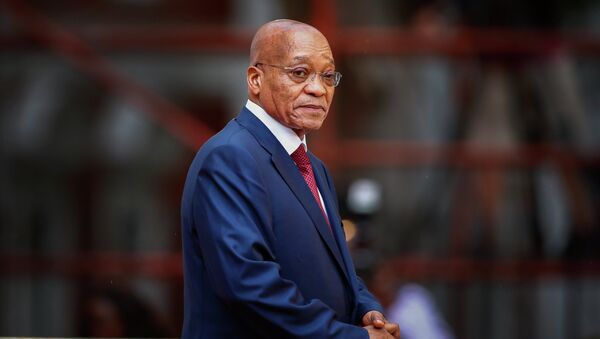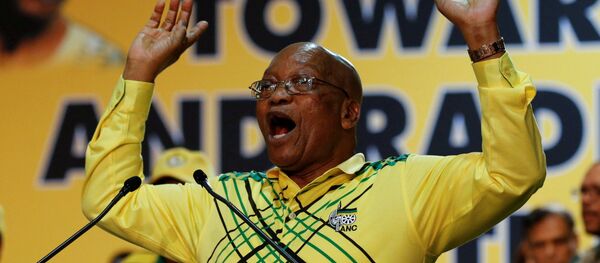The ANC decision followed an emergency session of the party's national executive committee, called earlier the same day, after five days of unsuccessful talks between Zuma and deputy president Cyril Ramaphosa, who took over the ANC leadership in December 2017.
Radio Sputnik discussed this with Richard Calland, a constitutional law professor, political analyst and author of "The Zuma Years."
Calland noted the similarity between the current political crisis and the one that happened 10 years ago, when former President Thabo Mbeki was also "recalled" from office by his own ANC. Zuma has been in office for the 10 years since then, with a term set to expire in mid-2019.
Calland revealed that back in 2005, Mbeki fired Zuma, then the Deputy President of South Africa, because of corruption allegations in a shady weapons deal back in 1990s. Zuma won leadership of ANC two years later and then in 2008 defeated his former superior and ousted him from office. But now the shoe is on the other food: it's Cyril Ramaphosa who has won the ANC leadership and is now seeking to oust Zuma in a similar fashion.
"He is determined to remove Zuma so that the ANC can have a fresh start and the government can have a chance to clean up the many corrupt institutions that have been corrupted by Jacob Zuma," Calland said.
Commenting on the most recent development, Calland said that Zuma is expected to defy the ANC's ultimatum to resign willingly. In this case, the ANC will have no other choice but to use its majority in the National Assembly to bring down Zuma by a vote of no confidence.
"It is an extraordinarily daring, to say nothing of reckless, ploy for Zuma to push this so far, because he will go out as the first ANC president to be brought down by his own party in Parliament," Calland said.
However, there is difference between Zuma and his predecessor, Mbeki, Calland noted. Although Mbeki was a controversial president, particularly because of his HIV/AIDS policy, he has never faced any corruption or enrichment charges.
"Mbeki was pushed out [of office] because there were suggestions that he politically interfered with the criminal proceedings against Jacob Zuma," Calland explained.
The reason Zuma resists being ousted is because, according to Calland, he knows that as soon as he loses his presidential immunity, he will immediately become vulnerable to criminal proceedings. There are some 700 charges against him that go back almost two decades, not to mention new charges that have accumulated while he's been in office.
"When Mbeki was told to resign by the National Executive Committee, he immediately did resign; he followed the edict, if you will, of his party. Zuma is a different character, of course, and he is likely to respond differently and fight all the way down," Calland said.
This isn't the first time that Zuma has faced attempt to remove him from office, though. In 2010, the Democratic Alliance party initiated a vote of no confidence over Zuma's illegitimate child. During Zuma's second term, the Democratic Alliance initiated four more impeachment attempts with the Economic Freedom Fighters party also making an attempt at impeachment.
All those attempts failed.
On March 27, 2017, both the Democratic Alliance and Economic Freedom Fighters, along with the United Democratic Movement, initiated yet another impeachment attempt and called on the ANC to support their initiative. However, in May 2017, the majority of the ANC voted against the impeachment. On December 29, 2017, the Constitutional Court ruled that the National Assembly failed to fulfill its obligation to prevent the president from violating the law.
As Sputnik reported earlier, Secretary-General of the African National Congress Ace Magashule says he is unaware of whether the ANC will support a motion of no-confidence against Zuma on February 22.
Calland, however, remains adamant that the chances of the ANC supporting Zuma this time are slim to none.
The opinions expressed are those of speaker alone and do not necessarily reflect the position of Sputnik News.



